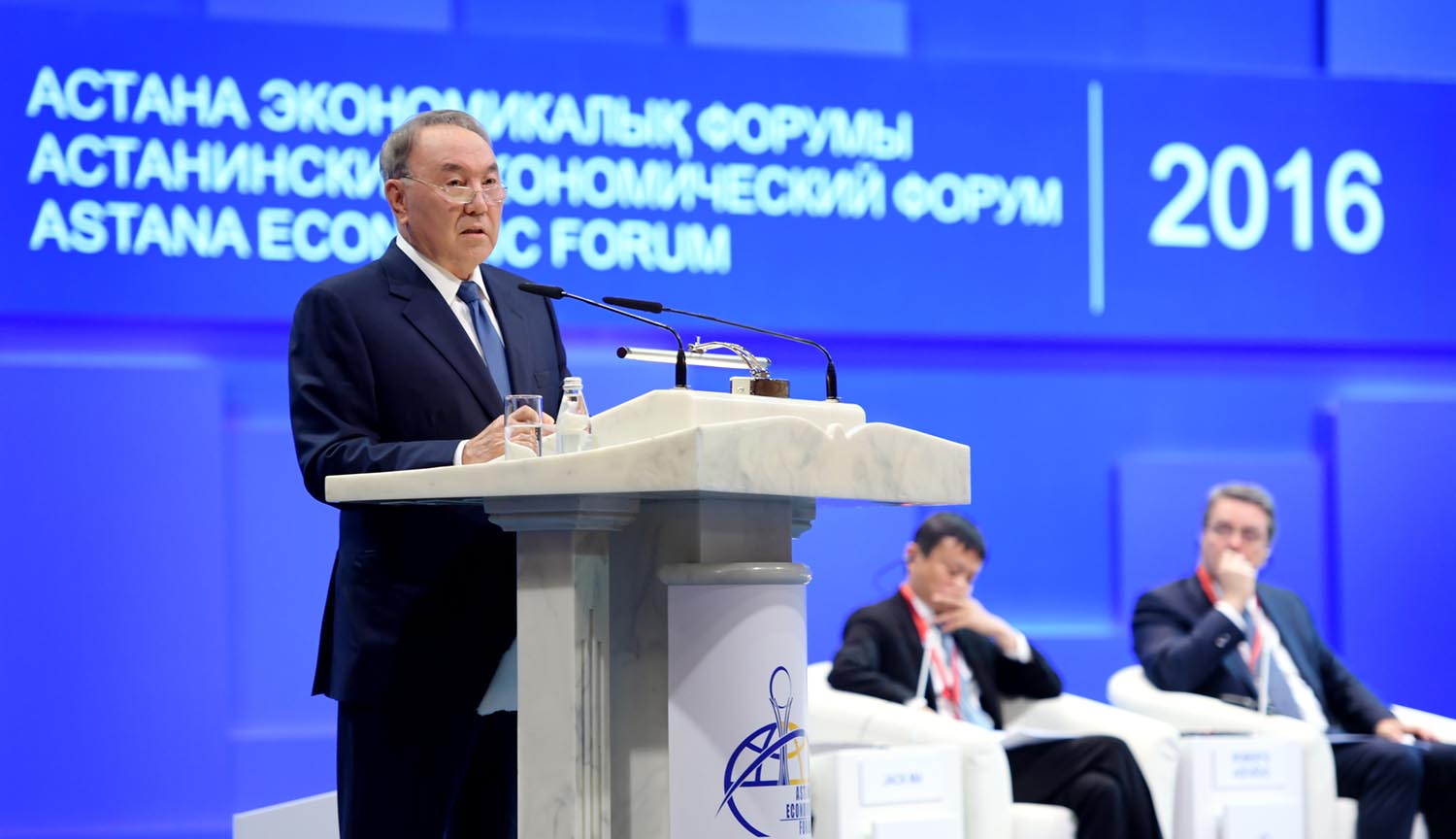The Emirati marine and inland terminal operating company DP World, in conjunction with Kazakhstan Temir Zholy (KTZ), the national railway company of Kazakhstan, has agreed to develop a Port Community System (PCS) for the country. The agreement was reached during the Astana Economic Forum, which took place in Kazakhstan’s capital city from June 15-16.
“Kazakhstan is at the crossroads of Asia, and although landlocked, president Nazarbayev’s commitment to improve internal and external connectivity to avoid the ‘transportation trap’ will propel growth,” said DP World Group’s Chairman and CEO Sultan Ahmed bin Sulayem at the Astana Economic Forum.
The companies penned two Memorandums of Understanding (MoU) on the sidelines of Astana Economic Forum, an annual event that provides a platform for discussion on the world’s economic opportunities and challenges, and hosts government and business figures from more than 80 countries. This year’s forum was held in conjunction with the opening week of the 2017 Astana Expo, or world’s fair, being held in Central Asia for the first time and addressing the role of ‘green’ energy solutions.
The first agreement calls for the establishment of a joint venture to implement and manage the PCS system, meant to improve the ease of doing business in Kazakhstan's ports and special economic zones via paperless, online transactions that will avoid long queues in administrative offices. A one-stop electronic platform developed by the DP World company called Dubai Trade, the PCS system unifies logistics centers, sea and dry ports into a single transport and logistics network. The platform enables the exchange of information between organizations involved in maritime, inland and airport processes.
The second MoU was signed between DP World, KTZ and Kazakhstan’s customs authorities to ensure the integration of Kazakhstani customs processes into the online portal.
Kazakhstan’s President Nursultan Nazarbayev first proposed the idea of a high-speed multimodal Eurasian Transcontinental corridor, meant to link the transportation systems of China and Western Europe via Kazakhstan, at the Astana Economic Forum in May 2015.
The proposed corridor’s rail tracks run horizontally through Kazakhstan, beginning in the east at Dostyk, which lies near the border with Xinjiang, China, passing through Aktogay, Zhezkazgan, and Beyneu, and reaching the Caspian Sea port of Aktau in the west.
Today more than 15 transit routes between China and Europe pass through Kazakhstan, considered both a post-Soviet Central Asian Republic and Caspian littoral state.
“In 2016, container traffıc in the direction of China-Europe-China via Kazakhstan has grown more than twice, from 581 to 1212 trains,” said Kazakhstan’s Minister for Investment and Development Zhenis Kassymbek at the forum on Thursday.
A brand new container service was launched on June 8 by Nazarbayev and China’s President Xi Jingping. The service allows sea containers coming from the Kazakhstani-Chinese Lianyungang terminal to transit through Kazakhstan’s Khorgos dry port near the country’s border with China and travel onward to other locales in Central Asia and Turkey.
By 2020, the overall volume of containers moving from China to Europe through Kazakhstan may amount to two million per year, according to estimates from Kazakhstan’s Ministry for Investments and Development.
Kazakhstan is reportedly working on the reconstruction, rehabilitation and repair of the nation’s highways, with priority given to international routes in order to make the country a more attractive destination for cargo transit.
One of the largest highway construction projects currently underway is the 8,400 kilometer-long Western Europe–Western China corridor, which crosses through Russia, Kazakhstan and China. The project will service three main cargo routes: China–Central Asia, China–Kazakhstan, China–Russia–Western Europe. The benefits of the project include redirecting portions of Chinese maritime shipments to road transportation, cutting down transit time from 45 days by sea to 11 days by road.
The Aktau sea port, located on the eastern shore of the Caspian Sea, is Kazakhstan’s main cargo and bulk terminal. Nearly 18 million tons of cargo pass through the port, which is complete with ferry terminals and ferry crossings for transportation of automobiles and railway cars.
Earlier this year the Dubai-based DP World announced its involvement in the development of a Special Economic Zone (SEZ) in Aktau to boost trade and logistics throughout the country. SEZ builds on DP World’s management advisory services contract with the Port of Aktau. The company also provides advisory services under a separate contract with Kazakhstan Temir Zholy (KTZ), Kazakhstan’s national railway company, for the development of the Khorgos SEZ and Inland Container Depot.







 Russian peacekeeping forces, deployed in the Karabakh (Garabagh) region of Azerbaijan since 2020, have commenced their withdrawal from the area.
Russian peacekeeping forces, deployed in the Karabakh (Garabagh) region of Azerbaijan since 2020, have commenced their withdrawal from the area.
 Iran's senior military leaders described the drone and missile attack on Israel on April 14 night as “successful".
Iran's senior military leaders described the drone and missile attack on Israel on April 14 night as “successful".
 Azerbaijan officially unveiled the logo for the upcoming 29th session of the Conference of the Parties to the United Nations Framework Convention o...
Azerbaijan officially unveiled the logo for the upcoming 29th session of the Conference of the Parties to the United Nations Framework Convention o...
 Iranian President Ebrahim Raisi warned Israel that it would face a "real and extensive" response if it makes any "mistake" following Tehran’s missi...
Iranian President Ebrahim Raisi warned Israel that it would face a "real and extensive" response if it makes any "mistake" following Tehran’s missi...



